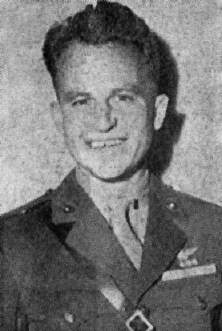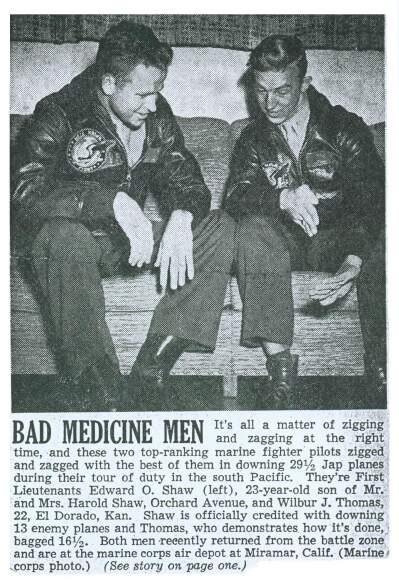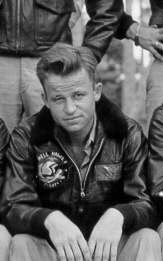Edward Shaw
Newspaper Clippings and Family Scrapbook
By Stephen Sherman, May, 2001. Updated July 1, 2011.
Edward "Bud" Shaw, USMC, shot down 13 Japanese planes in the Pacific. His family, like many servicemen's families, collected press clippings about their brave young man and wrote about his exploits in letters. The following press clippings were kindly sent to me by Jon Pickens, Shaw's nephew. My thanks also to Barbara, Edward's sister, who preserved the clippings, and to Jon's wife, Pamela, who "kept the ball rolling on this project."
I have included the newspaper articles on this web site, both to honor Shaw himself, and also to provide a little "sense of the era," by reproducing the them as close as possible. I've preserved the original capitalization (or lack of capitalization, as in "marine corps") and also the articles themselves, even though the bit about sleeping with .45's to protect their single eggs seems to be a bit of a "stretcher." The articles and one photo also refer to Wilbur J. Thomas, the top ace of VMF-213, with 16.5 aerial victories. (A close reader will notice that some articles refer to Shaw as "the marine corps first ace." That's a mistake; Marion Carl was the first Marine Corps ace. Possibly the writer meant that Shaw was the first pilot of VMF-213 to reach ace status, of perhaps the first ace from the Spokane area.)
The editorial from the Spokane Daily Chronicle is particularly touching and evocative of the spirit of that age, which like Shaw himself, apparently has passed on.
Fighter Pilot Sleeps With Gun by Side to Guard Precious Cargo Till BreakfastBy BOB JOHNSON
The inside of the sleeping quarters was as
black as your hat; the fighter pilots were sleeping, but with their 45s
handy. They were
not expecting intruders but they
were ready for a mass attack from
friend or enemy. |
Lieutenant Shaw, with a genuine south Pacific suntan, and a husky voice that's the result of a change in climate, returned home yesterday after more than 13 months against the enemy. It was "just an ordinary tour of duty" in which "nothing exciting" happened, he said. "You mean to say," we asked him, "that in 13 months and shooting down 13 planes, three of them all in one day, that nothing exciting happened?" He blushed, nodded his head and said that was about right. Getting information out of him was like trying to pull a camel through the eye of a needle. It was hard, that is, until we started asking about the Corsair fighter he flew. That was something he didn't mind talking about. "There's a plane!" he said. "It's the best fighter in the business. It won't do acrobatics like a Jap Zero, but it will outfight any Jap plane that ever got in the sky." First rejected by the navy. It was the marine squadron with which Lieutenant Shaw flew that proved the Corsair's quality. It all started over Rendova on June 30 when Shaw's outfit knocked the Japs out of the air by the dozens, Shaw himself getting two Jap float planes and a Zero.  Never shot down, Shaw's plane was shot up only once on September 11 when a Jap pilot, put three cannon shells into the wing. The plane started to smoke and Ed started the run back to base because he thought his ship was on fire. It was only carbon dioxide smoke, he discovered, very shortly, and turned to get back in the fight. But it was over by the time he got there. Lieutenant Shaw, son of Mr. and Mrs. Harold O. Shaw, Orchard Avenue, is a graduate of West Valley high school. He expects to be home until mid-January. Then he is to report to a base on the Mojave desert. |

Edward Shaw and Wilbur Thomas |
|
He flew as a test pilot at the Marine Corps base in the Mojave Desert (El Centro, I presume). The wartime articles imply he was flying Corsairs. He couldn't pull out of a dive, crashed, and died - aged 23.
| Tues., Aug. 1,1944.
Spokane Daily Chronicle Official Paper City of Spokane; Member
of Associated Press
Subscriber to United Press News Service
The Associated Presses exclusively entitled to the use for publication of all news dispatches credited to it or not otherwise credited in this paper, and also local news published herein. Published every evening except Sunday. Entered at postoffice at Spokane, Wash., as second-class matter. Phone Main 1121. Between 8 p. m. and 7:30 a. m. call night numbers: Editorial, 1121. 1130; subscriptions, 1122, 1123; business office, 1124: advertising, 1127. Subscription Rates. By city carrier or country agent, 23 cents per week, payable weekly. By mail, payable in advance, outside Spokane, in Washington, Idaho, Oregon and Montana: One year, $6; six months, $3.50; three months, $2.50; one month, $1. Elsewhere in the United States, Mexico and Canada: One year, $9; six months, $5; three months, $3.25; one month, $1.25. Mail rates apply only in territory not covered by Chronicle carrier. Weekly Chronicle, by mail. one year, $1.50. EAGER TO LIVE, HE DARED TO DIEWho shall be short-sighted enough to measure a life by the mere ticking of a clock?Captain Edward O. Shaw was but 23 years of age, yet he had lived richly. Deprived of the privilege of living out his years in peace and happiness, which is the birthright of every American boy, he still must be counted among those who have made much of existence. When the young marine fighter pilot ace was killed yesterday in a test flight in California he had to his credit 13 enemy planes shot down in aerial combat in the south Pacific. Among the first to throw back the Japs at Guadalcanal, he had been reassigned to instructor duty in this country. It would be folly to try to disregard the pain of such a leave- taking. And yet in this experience, which is common to us all, there is the solace that in his morning years Captain Shaw had found the opportunity and had had the courage to serve his fellow creatures as few are granted the privilege to do. When fate strode down the ranks of young service men in its inexorable way and singled out its man for the inevitable rendezvous with death it was not pointing at a pawn. In young Shaw it was singling out a man who had chosen his own course upon the checkerboard of nights and days, who had gone out to meet destiny unafraid. |
Sources:
- Thomas G. Miller, Cactus Air Force, Harper and Row, 1969
- Cactus Air Force web site
- Mark Styling, Corsair Aces of World War 2, Osprey Publishing, 1995
- a defunct VMF-213 site, by Dan McAnarney


